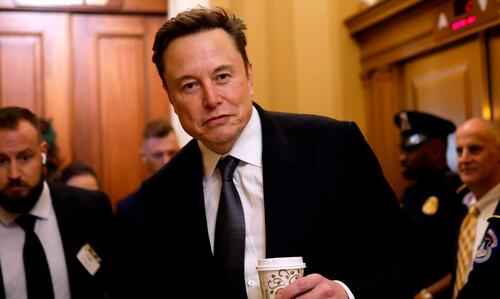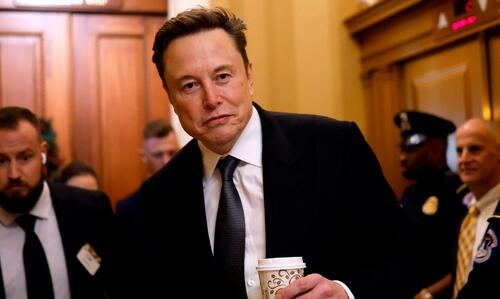Musk Derangement Syndrome
Authored by Roger Kimball via American Greatness,
Move over, Trump Derangement Syndrome! It is time to make room for the latest pathology: Musk Derangement Syndrome.
The hysteria has been building for some time.
It wasn’t so long ago that Elon Musk enjoyed enviable street cred among the brotherhood of snotty, self-congratulating elites. A green energy guru, he made the hearts of the Sierra Club Sultans go pit-a-pat with his talk of “sustainable transport” and solar roofs.
Then Musk made several missteps. The first was buying Twitter and restoring open discourse to a platform that was started to encourage, well, open discourse but had become a headquarters of government surveillance and censorship during the first Trump administration. Musk never recovered his progressive credentials after he came out as a supporter of free speech.
But the atmosphere of left-wing disapproval that was swaddling Musk since his purchase of Twitter turned toxic and hysterical this past summer when, following the assassination attempt against Donald Trump, he announced that, gasp, he was supporting Trump’s reelection bid. Could you believe it? Supporting Trump’s reelection—especially actively, ostentatiously, effectively supporting Trump’s reelection bid—was like the sin against the Holy Ghost: unforgivable.
And then Musk compounded the perfidy by joining forces with Vivek Ramaswamy to form DoGE: the “department” of government efficiency, a time-limited initiative to help bring government spending and regulation under control. They have set an expiration date of July 6, 2026, by which date they hope to have been able to give America a 250th birthday gift of fiscal solvency and rational regulation.
Many people have wondered what DoGe would be able to accomplish since it would just be making recommendations with no real power to enforce them.
We have just been vouchsafed a glimpse of its possible potency.
For several years now, the approach of Christmas has brought not just visions of sugar plums and Santa sightings but also the annual Congressional budget snit known as CR, short for “Continuing Resolution.”
The exercise now seems almost venerable. In fact, though, it is an admission of failure, begotten in legislative irresponsibility, bred in malodorous sluices of pork-laden, politically correct greed.
Every year, Congress is supposed to deliver a budget before it breaks for Christmas. America’s last real budget was passed in 1996. The usual expedient is the stopgap measure of a “continuing resolution” in which Congress says it will just continue funding things at more or less the same level as it had been, kicking the can down the road and into the next fiscal year. (For an excellent explanation of the process, I recommend this brief but gimlet-eyed presentation: some college government department should hire this chap.)
Contemplating the embarrassing sideshow that was this year’s CR squabble, a friend reminded me of the old quip. If “con” is the opposite of “pro,” what is the opposite of “Congress?” This year, as has become the usual practice, Congress waited until the last possible moment to plop the text of the Continuing Resolution on the desks of our Conscript Fathers. What had started as a twenty-page document had lizzoed into a 1547-page behemoth. This was no “continuing resolution” but a porker full of self-serving giveaways to Congress as well as numerous woke initiatives designed to stymie the incoming Trump administration.
Among many noxious items were a provision to scuttle any serious inquiry into the activities of Liz Cheney’s January 6 investigation and another provision to continue funding the State Department’s Global Engagement Center. This innocuous-sounding initiative (we’re all in favor of “global engagement,” right?) funds the Britain-based Global Disinformation Index, which encourages advertisers to flee media outlets of which the guardians of the Narrative disapprove. This includes the Washington Examiner, RealClearPolitics, Reason, the New York Post, Blaze Media, the Daily Wire, the Federalist, the American Conservative, Newsmax—and American Greatness. It is, as Vivek Ramaswamy observed, a “key node of the censorship industrial complex.”
This monstrosity was stopped, but how? Critics of Musk blame him. “He tweeted about our beloved monstrosity,” they skirled. “He killed the bill.”
But this is wrong. Musk did indeed post, with Olympic assiduity, about the egregious piece of self-serving lard.
But what scotched the original bill was the public outcry.
Musk may have been the catalyst, the tocsin in the night.
The fire brigade was manned by ordinary citizens.
As one social media poster put it, “All Elon did was read a bill, post on a public platform that the reckless spending in it was unacceptable, ask others to contact their representatives if they agreed, and made clear that he will help primary Ds + Rs who support it.”
This is exactly right.
But to listen to the Dems, you would think the world was coming to an end.
On December 18, Rep. Richard Neal (D-MA), knickers twisted tight, asked angrily, “Can you imagine what the next two years are going to be like if every time that Congress works its will and then there’s a tweet? Or from an individual who has no official portfolio, who threatens members on the Republican side with a primary? And they succumb?” Yes, just imagine, Dick, if it is the people themselves, and not your little club of coddled thumb suckers, who shed light on the activities of Congress as it pretends to go about the people’s business?
Sen. Chris Murphy (D-CT) sounded a similar note. “We had a deal to avert a shutdown,” this pathetic tool skirled. “Musk et al. blew it up because it didn’t help billionaires enough.”
Right.
Then came the sweaty lie.
“They wrote a new bill to cut cancer treatment for kids and grease a new tax cut for the rich.”
There are no “tax cuts for the rich.” And although “cutting cancer treatment for kids” got massive circulation for fifteen minutes, Murphy neglected to mention that the funding for pediatric cancer treatment was passed by the GOP-controlled House last March and was awaiting passage by the Democrat-controlled Senate.
It is an ill wind that blows nobody good, however, and I am grateful to this latest nocturnal emission of Democrat ire for my introduction to Rep. Rosa DeLauro (D-CT). Some unkind people have said that she is an escapee from the set of an Addams Family movie. That is grossly unfair—to the Addams family. I am not sure whether it was DeLauro who first referred to Musk as “President Musk.” She certainly helped circulate the epithet, which is part of a flaccid, already failing effort to drive a wedge between Musk and Donald Trump. De Lauro, understand, is not just another of the 538 members of Congress. She was chair of the House Appropriations Committee for the first two years of the Biden administration and has, since the GOP takeover in 2022, been its ranking member. She is the perfect face for the Democrat Party circa 2024. Savor her here as she casts her imprecations, like one of the weird sisters in Macbeth, against Elon Musk.
In the event, the final bill, called the American Relief Act, 2025, passed in the opening minutes of Saturday, December 21. It was the third version of the CR. At some 120 pages, it is less than a tenth as long as the original Brobdingnagian version. Who applied the Ozempic? Notwithstanding the wailing of the Dems, it wasn’t Elon Musk. It was the duly elected representatives of the people who, caught with their hands in the cookie jar, withdrew almost all the pork and politically noxious provisions of the original. It was a big win for Trump.
What tipped the scale? I suspect that a widely circulated picture of the original bill side by side with its slimmed-down cousin had people aghast and searching for their congressman’s telephone number. Donald Trump had wanted them to raise the debt ceiling now, presumably so he wouldn’t have to do it on his watch, but they denied him that concession. It was about the only one they did deny him.
Everywhere one turned, there were shouts and whispers that we’d just missed a major tragedy. “Government Shutdown Averted!” the headlines rang out. But what difference would a government shutdown have made? As John Stossel noted on X, past shutdowns show that such contingencies are largely theatrical events. “Life went on,” he observed. At the end of the day, “government demonstrated how needless most of it is.”
There are two main lessons to be drawn from this episode.
-
One is that timely, forceful, and rapidly repeated exposure of government malfeasance can prompt the public to intervene and end it. Musk is accounted a villain by the left because he repeatedly shone a klieg light on the worst aspects of the adipose abomination that was the original bill. Somehow, no one had been so effective a town crier before.
-
The second lesson has to do with the utterly irresponsible, but by now habitual, process that Musk helped to expose. The insidious practice of turning to “continuing resolutions” as a substitute for timely legislation is an invitation to corruption. The Dems have eagerly accepted the invitation, injecting all manner of tendentious (and, it may go without saying, expensive) desiderata into the annual CR fest, convinced that the public won’t notice.
The remedy is twofold:
1. Insist that proposed legislation be published well in advance of its deadline and
2. disaggregate the pieces of any proposed legislation so that each bill covers only a single subject. No more sneaking woke expedients into general spending legislation at the last minute.
Mentions of “spending” bring me to the existential pressure that first prompted Musk and Ramaswamy to embark on their quest for “government efficiency”: out-of-control, potentially paralyzing government spending. Together with the regulatory nightmare that the bureaucratic state has saddled us with, incontinent spending (the federal debt is currently north of $36 trillion) threatens to impoverish the United States and, hence, the world. Milton Friedman was right to advise us to keep our “eye on one thing and one thing only: how much government is spending because that’s the true tax. . . . If you’re not paying for it in the form of explicit taxes, you’re paying for it indirectly in the form of inflation or in the form of borrowing.”
Musk has said that he hopes to trim government spending by $2 trillion per annum. If he and Vivek can manage a quarter of that, they will be national heroes. In fact, they already are.
Tyler Durden
Mon, 12/23/2024 – 07:20


